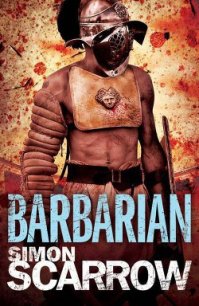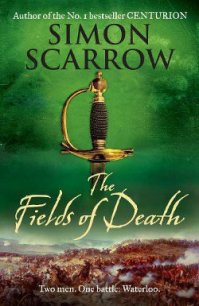Sword and Scimitar - Scarrow Simon (читать книги онлайн полные версии .TXT) 📗
Nothing moved. He was alone.
Once his frantic breathing had calmed, Thomas drew his sword and cautiously headed for an opening that he guessed would lead into one of the approach trenches. The Turks had left little behind them, merely broken tools and rags. Edging round the corner, Thomas followed the trench towards one of the batteries that had fallen silent three days earlier. As he made his way through the silence and stillness, he saw soil- and rock-filled wicker baskets that made up the embrasures of the battery, but no sign of the muzzles of the cannon that had been pounding Birgu for the last two months.
At length the trench sloped up and entered the battery. The air inside the fortified position was thick with the acrid odour of burning and Thomas saw the blackened remains of gun carriages, barrel staves and lengths of timber used to construct the platforms for the Turkish guns. A short distance behind the battery was a large mound. Near the top, a handful of wild dogs had scratched away at the thin scraping of soil that had been quickly thrown over the mass grave, and the half-starved animals were feasting on the dead limbs they had exposed.
From the raised platform in the centre of the battery Thomas could see puffs of smoke from the batteries on the other side of the harbour, but there was no sign of activity from the batteries facing the defences at the end of each of the promontories of Senglea and Birgu. He felt a surge of hope, and then exultation at the realisation that the enemy were abandoning their siege. He took a last look round at the heights on either side and then sheathed his sword and hurried back down the trench towards the bastion, a quarter of a mile away. He had thought about striding directly across the open ground but there was still a possibility that the enemy had left a handful of snipers behind to harass the defenders the moment they ventured too far outside their defences.
By the time he returned to the bastion, the Grand Master was waiting for him, an excited gleam in his weary face. ‘Well?’
‘They have gone, sir.’ Thomas crossed to the parapet and stood in full view of the enemy trenches as he indicated his route. ‘I went as far as that battery, there. I saw no one, and the Turks have carried away whatever equipment and supplies they could and burned the rest. They have abandoned their positions on this side of the harbour, I’m sure of it.’
La Valette nodded. ‘The lookouts on St Angelo have also seen some of their guns being withdrawn from the batteries on the Sciberras ridge.’
The dull roar of intermittent cannon fire from across the harbour proved that some guns were still in position. Thomas turned towards St Elmo and the peninsula stretching out beyond. He watched the flashes and puffs of the next few shots and said, ‘There’s not more than one gun left in each of those batteries, sir. No more than six in total. They’ve been left to keep our attention and cover the withdrawal of their army to their ships.’
‘Then we’ve beaten them!’ Richard exclaimed and smacked his gloved fist into the palm of his other hand. ‘By all that’s holy, we’ve done it.’
‘No.’ La Valette stroked his chin thoughtfully. ‘Mustafa Pasha must know that we are on the edge of defeat. He only has to wait until hunger, or the failure of our will, brings about our surrender. If I were him, I would stay here to the bitter end and have a prize to hold out to the Sultan. There can only be one reason for this. The Turks know that our relief force is coming. Don Garcia has stirred at last.’
There was a brief silence as they contemplated the Grand Master’s conclusion.
‘Then what should we do, sir?’ asked Richard. ‘Sally out from our defences and harry the Turks?’
La Valette frowned slightly. ‘Young man, it would be a pitiful force that marched out from Birgu to do battle. A company of scarecrows swathed in dressings. No. If Don Garcia is coming, then we shall await him. Except for one thing.’ He turned his gaze in the direction of St Elmo. ‘We shall take back our fort. I would see the standard of the Order flying there again. As soon as can be.’ He looked at Thomas. ‘We have ten horses left in the stables. All that is left. Take them. You, your squire and eight picked men. Ride to St Elmo. If you find no Turks before you, then occupy the fort and raise the standard from the cavalier. Have two of your men climb to the crest of the ridge to observe the enemy, and look for the first sign of Don Garcia’s army. There are still fresh troops at Mdina. I’ll send a man there with orders for the garrison to make ready to march to Don Garcia’s support.’
‘Very well, sir.’ Thomas bowed his head. ‘We’ll ride out as soon as we are ready.’
The huge camp that had sprawled across the land around the Marsa was abandoned and littered with equipment and smouldering heaps where the Turks had taken the time to bum what they could. Thomas and his small party of horsemen entered the camp shortly before noon. The sun beat down from a clear sky and locked the scene in a stifling embrace. The stench of burning was matched by the foul odour of the enemy’s latrines and Richard pressed the back of his gauntlet to his nose as their bony mounts clopped through the camp.
As they approached the far side, where the track led along the Sciberras peninsula to St Elmo, they came across several tents, the only ones remaining. The air was thick with the sickly sour smell of rotting flesh and Thomas swallowed as he edged his horse over to the open flaps of the nearest tent. The buzzing of flies through the still air was the only sound apart from the scraping of the horses’ hooves and their soft champing. Through the flaps he could see rows of men lying on soiled bedrolls. Every one of them was dead, many with cut throats; the Turks had clearly resolved not to let any of their men be captured or left to the mercy of the vengeful Maltese.
‘Good God . . .’ Richard muttered as he leaned from his saddle and glimpsed the horror inside the tent.
Thomas turned to him with a weary expression. ‘I wonder that you can still utter those words.’ Then he turned his horse and spurred it into a trot to quit the deathly scene as swifdy as possible and fill his lungs with untainted air.
They continued along the track, the ridge rising up to their left, the waters of the harbour sparkling to their right. There was no sound of life from the ridge. They rode past four of the batteries from where the enemy’s guns had pounded Senglea and Birgu, and St Elmo before that. Two of the guns had suffered damage to their carriages and had been left behind, their barrels split by a blocked charge to render them useless.
At last the track rounded an outcrop of rock and there before the riders lay the ruined walls of the fort. Thomas reined in and grimly surveyed the scene. The ground before the fort was scarred by the lines of enemy trenches. A ramp of compacted rock and soil had been laid up into one of the breaches so that the Turks could mount their guns on the surviving walls to fire across the harbour. As before, there was no sign of life. Thomas waved his hand forward and the small column trotted towards the fort. As they drew closer Thomas saw a line of stakes at the top of the ramp, each one topped with a dark, withered orb. His stomach clenched with disgust and rage as he realised what they were.
‘Aren’t those . . . heads?’ asked Richard.
Thomas nodded once then urged his horse to a trot so that Richard and the others would not see his grief. After two months in the sun there was little to recognise in the dried features of the faces on the stakes. Thin lips curled back from teeth and the skin had shrunk against the bone. Wispy tendrils of hair clung to the scalps and the eyes had long since been devoured by gulls. Thomas felt sickened by the sight. These pitiful remains were all that was left of the comrades who had given their lives to hold St Elmo far longer than anyone had thought possible. They had paid with their suffering and death to save their comrades in Birgu and Senglea. As he looked upon them, Thomas felt a pang of guilt that he still lived. He tried to push the feeling aside, reasoning that he had fought on for as long as he could and that to stay and die would have been poindess — worse than pointless now that he had Maria and his son to live for. But the mute testimony to sacrifice of the heads mocked his reason and shamed him.




